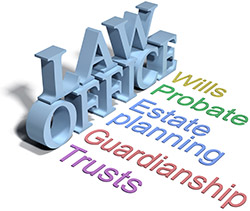|
|
Trusts & Estate Planning
Monday, December 7, 2015

How can I control my assets after death?
The practice of estate planning is dedicated to preserving an individual’s control over his or her assets after death. A simple will can control which individuals receive what assets, but a more thorough plan has the potential to do much more. Establishing a trust is the most common method used to exercise this kind of control.
A trust can issue a bequest restricted by a condition; for example, a trust might be established to pay out $10,000.00 to a specific grandchild only once he or she has reached 18 years of age. Multiple payments can be made to the beneficiaries as long as the trust is funded. The trust can stipulate that the grandchild may have to graduate from college to receive the money, or even that he or she must graduate from a specific school with a minimum grade-point average or membership in a particular fraternity or sorority.
A trust can make the condition of payment as specific or as broad as the creator of the trust wishes. It may, for instance, bequeath benefits to a humanitarian organization on condition that the organization continues to provide food and shelter to the homeless. There is no limit to the number of conditions permissible in a trust document. Even when the conditions go against public policy and general norms and mores established by society, as long as the conditions may be met legally, they will be upheld by the court.
In order to create a trust, there must be a capital investment to fund it and a trustee must be named. The trustee is responsible for protecting the assets of the trust, investing them to the best of his or her ability, managing real estate and other long-term assets, interpreting the trust document, communicating regularly with the beneficiaries of the trust and performing all of these actions with a high level of integrity. Trust assets may be used to pay for expenses of managing the trust as well as to provide a stipend for the trustee if so provided for in the trust document.
If a trust document is not well written, it may be the target of a lawsuit seeking to dissolve the trust and disburse the assets held therein. Even if the trust is defended successfully, the costs of this challenge may deplete its coffers and frustrate the very reason for its creation. In order to avoid these possible pitfalls, it is imperative that a trust document be drafted by an attorney with a high degree of experience in estate planning law.
Monday, November 30, 2015

Estate planning is designed to fulfill the wishes of a person after his or her death. Problems can easily arise, however, if the estate plan contains unanswered questions that can no longer be resolved after the person's demise. This can, and frequently does, lead to costly litigation counter-productive to the goals of the estate. It is important that will be written in language that is clear and that the document has been well proofread because something as simple as a misplaced comma can significantly alter its meaning.
Planning for every possible contingency is a significant part of estate planning. Tragic scenarios in which an estate planner’s loved ones predecease him or her, though uncomfortable, must be considered during the preparation of a will to avoid otherwise unforeseen conflicts.
Even trained professionals can make significant mistakes if they are not well versed in estate planning. An attorney who practices general law, while perfectly capable of preparing simple wills, may not understand the intricacies of trusts and guardianships. A great many attorneys, not aware of the tax consequences of bequests involving IRAs, may leave heirs with unnecessary financial obligations. If an attorney is not knowledgeable enough to ask the proper questions, he or she will be unable to prepare an estate plan that functions efficiently and ensures the proper distribution of the estate's assets.
In spite of the wealth of an individual, the estate may be cash deficient if that wealth is tied up in assets at the time of the individual's death. Problems can also result if an estate planner has distributed assets into joint bank accounts or accounts with pay on death provisions. If the executor of the estate does not have access to funds to pay the estate's bills or taxes, the heirs of the estate may run into trouble.
Even if estate planning is handled well from a logistical point of view, lack of communication with loved ones can interfere with a will's desired execution. A tragedy that incapacitates the testator can occur suddenly, so it is imperative that a savvy estate planner confers with loved ones as soon as possible, making them aware of any future obligations, such as life insurance premiums that must be paid and informing them of the location of any probate documents and inventories of assets. Such conversations ensure that the individual's wishes will be carried out without complications or delay in the event of an unexpected incapacity.
In addition to communicating logistical information, it is also essential to schedule a personal conversation with loved ones that makes clear any sentimental bequests or large gifts that require explanation. This avoids the shock or discomfort that may arise after one's death during which a well-thought-out decision is questioned as impulsive or irrational. Such direct communication of one's plans avoids unnecessary envy, arguments or rivalry among family and friends.
Consulting with attorneys who specialize in estate planning is the cornerstone of creating a plan to ensure that one's desires are carried out and that all the bases are covered. Estate planning attorneys serve as invaluable repositories of all information necessary to strategizing a plan that not only meets one's personal needs and desires, but is legally binding.
Monday, November 2, 2015
 A life estate is a special designation in probate law referring to a gift to a family member that lasts as long as the life of the recipient. If an individual uses a life estate as part of his or her estate plan, whatever is bequeathed under the life estate will revert back to the residual estate upon the death of the life estate recipient. It is most common in scenarios where an individual starts a new family without children later in life and wants to ensure that the present spouse is taken care of for the remainder of her or his life. The owner of a life estate is called a life tenant. A life estate is often used as an alternative to a trust because it provides the life tenant with more control over the transferred asset. A life estate is a special designation in probate law referring to a gift to a family member that lasts as long as the life of the recipient. If an individual uses a life estate as part of his or her estate plan, whatever is bequeathed under the life estate will revert back to the residual estate upon the death of the life estate recipient. It is most common in scenarios where an individual starts a new family without children later in life and wants to ensure that the present spouse is taken care of for the remainder of her or his life. The owner of a life estate is called a life tenant. A life estate is often used as an alternative to a trust because it provides the life tenant with more control over the transferred asset.
A life tenant may treat an asset as his or her own. A home may be rented to tenants for income. The life tenant may sell his or her interest in the property to the heirs of the residual estate or to third parties. If the property is sold to a third party, that third party must surrender the property to the residual heirs upon the death of the life tenant.
Though the property belongs to the life tenant, the life tenant has a duty to the residual heirs to keep the property reasonably maintained and in good condition. He or she has an obligation to avoid mortgage arrearages and tax liens while in possession of the property. Exploiting natural resources on the property may be restricted during a life tenancy. A life tenant may not bequeath his or her interest in a life estate through a will because that interest immediately terminates upon the life tenant’s death. Significant changes to the property need to be agreed upon by all parties.
Though there are benefits, there are also drawbacks to establishing a life estate as part of an estate plan. The action could create estate tax issues for the tenant’s estate. In addition, creditors of the tenant may attach liens on the property, creating complicated legal issues for the heirs of the residual estate.
Monday, October 26, 2015

Before transferring your home to your children, there are several issues that should be considered. Some are tax-related issues and some are none-tax issues that can have grave consequences on your livelihood.
The first thing to keep in mind is that the current federal estate tax exemption is currently over $5 million and thus it is likely that you may not have an estate tax issue anyway. If you are married you and your spouse can double that exemption to over $10 million. So, make sure the federal estate tax is truly an issue for you before proceeding.
Second, if you gift the home to your kids now they will legally be the owners. If they get sued or divorced, a creditor or an ex- in-law may end up with an interest in the house and could evict you. Also, if a child dies before you, that child’s interest may pass to his or her spouse or child who may want the house sold so they can simply get their money.
Third, if you give the kids the house now, their income tax basis will be the same as yours is (the value at which you purchased it) and thus when the house is later sold they may have to pay a significant capital gains tax on the difference. On the other hand if you pass it to them at death their basis gets stepped-up to the value of the home at your death, which will reduce or eliminate the capital gains tax the children will pay.
Fourth, if you gift the house now you likely will lose some property tax exemptions such as the homestead exemption because that exemption is normally only available for owner-occupied homes.
Fifth, you will still have to report the gift on a gift tax return and the value of the home will reduce your estate tax exemption available at death, though any future appreciation will be removed from your taxable estate.
Finally, there may be more efficient ways to do this through the use of a special qualified personal residence trust. Given the multitude of tax and practical issues involved, it would be best to seek the advice of an estate planning attorney before making any transfers of your property.
Monday, October 12, 2015

An executor's fee is the amount charged by the person who has been appointed as the executor of the probate estate for handling all of the necessary steps in the probate administration. Therefore, if you have been appointed an executor of someone’s estate, you might be entitled to a fee for your services. This fee could be based upon a variety of factors and some of those factors may be dependent upon state, or even local, law.
General Duties of an Executor
- Securing the decedent's home (changing locks, etc.)
- Identifying and collecting all bank accounts, investment accounts, stocks, bonds and mutual funds
- Having all real estate appraised; having all tangible personal property appraised
- Paying all of the decedent’s debts and final expenses
- Making sure all income and estate tax returns are prepared, filed and any taxes paid
- Collecting all life insurance proceeds and retirement account assets
- Accounting for all actions; and making distributions of the estate to the beneficiaries or heirs.
This list is not all-inclusive and depending upon the particular estate more, or less, steps may be needed.
As you can see, there is a lot of work (and legal liability) involved in being the executor of an estate. Typically the executor would keep track of his or her time and a reasonable hourly rate would be used. Other times, an executor could charge based upon some percent of the value of the estate assets. What an executor may charge, and how an executor can charge, may be governed by state law or even a local court's rules. You also asked whether the deceased can make you agree not to take a fee. The decedent can put in his or her will that the executor should serve without compensation but the named executor is not obligated to take the job. He or she could simply decline to serve. If no one will serve without taking a fee, and if the decedents will states the executor must serve without a fee, a petition could be filed with the court asking them to approve a fee even if the will says otherwise. Notice should be given to all interested parties such as all beneficiaries.
If you have been appointed an executor or have any other probate or estate planning issues, contact us for a consultation today.
Monday, September 28, 2015

If your estate plan and related documents are properly and carefully drafted, it is highly unlikely that the court will disregard your wishes and award the excluded child an inheritance. As unlikely as it may be, there are certain situations where this child could end up receiving an inheritance depending upon a variety of factors.
To understand how a disinherited child could benefit, you must understand how assets pass after death. How a particular asset passes at death depends upon the type of asset and how it is titled. For example, a jointly titled asset will pass to the surviving joint owner regardless of what a will or a trust says. So, in the unlikely event that the disinherited child was a joint owner, that child would still inherit the asset because of how it was titled.
Similarly, if you left that disinherited child as a named beneficiary on a life insurance policy or retirement plan asset, such as an IRA or 401k, that child would still receive some of the benefits as the named beneficiary even if your will stated they were to take nothing. Another way such a "disinherited" child might receive a benefit is if all other named beneficiaries died before you.
So, assume you have three children and you wish to disinherit one of them and you state you want all of your assets to go to the other two, and if they are not alive, then to their descendants. If those other two children die before you and do not have any descendants, there may be a provision that in such a case your "heirs at law" are to take your entire estate and that would include the child you intended to disinherit.
If you wish to disinherit a child, all of these issues can be addressed with proper and careful drafting by a qualified estate planning lawyer.
Monday, September 21, 2015

When deciding who will inherit your assets after you die, it is important to consider that you might outlive the beneficiary you choose. If you have added someone to your financial accounts to ensure that he or she receives this asset after you die, you might be concerned about what will happen should you outlive this person.
What happens to a joint asset in this situation depends upon the specific circumstances. For example, if a co-owner that was meant to inherit dies first, the account will automatically become the property of the other co-owners and will not be included in the decedent’s estate. However, whether it is somehow included in this person’s taxable estate, and is therefore subject to state death tax, also depends on state law. Assuming the other co-owners were the only ones to contribute to this account, and that the decedent did not put any of his or her money into the account, there may be state laws that provide that these funds are not taxed. The other co-owners might have to sign an affidavit to that effect and submit it to the state department of revenue with the tax return. Also, if the decedent’s estate was large enough to require the filing of a federal estate tax return ($5,340,000 in 2014) the same thing may be needed in order to exclude this money from his or her taxable estate. You would generally state that this person’s name was placed on the account for convenience, and that the money was contributed by the other co-owners.
If you are considering adding someone to your financial accounts so that they inherit it when you die, you should contact an experienced estate planning attorney to discuss your options.
Monday, September 7, 2015

This question presents a fairly common issue posed to estate planning attorneys. The solution is also pretty easy to address in your will, trust and other estate planning documents, including any guardianship appointment for your minor children.
First, its important to note that you should not delay establishing an estate plan pending the birth of a new child. In fact, if your planning is done right you most likely will not need to modify your estate plan after a new child is born. The problem with waiting is that you cannot know what tomorrow will bring and you could die, or become incapacitated and not having any type of plan is a bad idea.
In terms of how an estate plan can provide for “after-born” children, there are a few drafting techniques that can address this issue. For example, in your will, it would refer to your current children typically by name and their date of birth. Then, your will would provide that any reference to the term "your children" would include any children born to you, or adopted by you, after the date you sign your will.
In addition, in the section or article of your will that provides how your estate and assets will be divided, it could simply provide that your estate and assets will be divided into separate and equal shares, one each for "your children." That would mean that whatever children you have at the time of your death would receive a share and thus the will would work as you intend, even if you did not amend it after having a new child.
On a side note, you should make certain that your plan does not give the children their share of your estate outright while they are still young. Rather, your will or living trust should provide that the assets and money are held in a trust structure until they are reach a certain age or achieve certain milestones such as college graduation or marriage. Any good estate planning attorney should be able to advise you about this and help walk you through the various options you have available to you.
Monday, August 17, 2015
 When creating a trust, it is common practice that the person doing the estate planning will name themselves as trustee and will appoint a successor trustee to handle matters once they pass on. If you have been named successor trustee for a person that has died, it is important that you hire a wills, trusts and estates attorney to assist you in carrying out your duties. Although the attorney that originally created the estate plan would most likely be more familiar with the situation, you are not legally required to hire that same attorney. You can hire any attorney that you please in order to determine what your obligations are. When creating a trust, it is common practice that the person doing the estate planning will name themselves as trustee and will appoint a successor trustee to handle matters once they pass on. If you have been named successor trustee for a person that has died, it is important that you hire a wills, trusts and estates attorney to assist you in carrying out your duties. Although the attorney that originally created the estate plan would most likely be more familiar with the situation, you are not legally required to hire that same attorney. You can hire any attorney that you please in order to determine what your obligations are.
If the decedent had a will it is common that the successor trustee is also named as the executor. Although the role of executor is similar to that of trustee, there are technical differences. If there was a will, you should consult with an attorney to determine if a court probate process will be required to administer the estate. If all assets were titled in the trust prior to the person’s death, or passed by beneficiary designation, such as in the case of life insurance and retirement plan assets (such as 401ks, IRAs, etc.), then a court probate may not be needed. However, if there were accounts or real estate in the person’s name alone that were not covered by the trust, a court probate may be necessary.
During the probate process, all of the deceased person’s assets must be collected and accounted for. This includes all bank accounts, stocks, bonds, mutual funds, investment accounts, retirement assets, life insurance, cars, personal belongings and real estate. All of these assets should be valued and listed on one or more inventories. Depending upon the value of the assets, an estate tax return may be needed. You should be aware of any final expenses, the person’s final income tax returns, and any creditors. Although this process is lengthy, once all of the appropriate steps are taken, the assets will be distributed and the estate will come to a close.
If you have been named a successor trustee, an experienced estate planning attorney can help you through this process and make sure you carry out your legal duties as required. Contact us for a consultation today.
Monday, July 6, 2015

If you are a parent and you are considering estate planning, one of the most difficult decisions you will have to make is choosing a guardian for your minor children. It is not easy to think of anyone else, no matter how loving, raising your child. Yet, you can make a tremendous difference in your child’s life by planning ahead.
The younger your child, the more crucial this choice is, because very young children cannot form or express their own preferences about caregivers. Yet young children are not the only ones who benefit from careful parental attention to guardianship. Children close to 18 years old will be legal adults soon, but, as you well know, may still need assistance of a parental figure after the fact.
By naming and talking about your choice of guardian, you can encourage a lifelong bond with a caring family. The nomination of guardians is a straightforward aspect of any family’s estate plan. It can be as basic or detailed as you want. You can simply name the guardian who would act if both you and your spouse were unable to or you can provide detailed guidance about your children and the sort of experiences and family environment you would like for them. Your state court, then, can give strong weight to your expressed wishes.
There are essentially four steps to this process. First, make a list of anyone you know that might be a candidate for guardian of your children. It is important to think beyond your sisters and brothers and consider cousins, aunts and uncles, grandparents, child-care providers and business partners. You might also want to consider long-time friends and those you’ve gotten to know at parenting groups as they may share similar philosophies about child-rearing. Second, make a list of factors that are most important to you. Here are some to consider:
- Maturity
- Patience
- Stamina
- Age
- Child-rearing philosophy
- Presence of children in the home already
- Interest in and relationship with your children
- Integrity
- Stability
- Ability to meet the physical demands of child care
- Presence of enough “free” time to raise children
- Religion or spirituality
- Marital or family status
- Potential conflicts of interest with your children
- Willingness to serve
- Social and moral habits and values
- Willingness to adopt your children
You might find that all or none of these factors are important to you or that there are others that make more sense in your particular situation. The third step is to, match people with priorities. Use the factors you chose in step two to narrow your list of candidates to a handful.
For many families, it is as easy as it looks. For others, however, these three steps are fraught with conflict. One common source of difficulty is disagreement between spouses. But, consensus is important. Explore the disagreements to see what information about values and people is important to one another and use all of your strongest communications skills to understand each other’s position before you try to find a solution that you can both feel good about. Step four is to make it positive. For some parents, getting past this decision quickly is the best way to achieve peace of mind and happiness. For others, choosing a guardian can be the start of an intensive relationship-building process. An attorney who understands where you and your spouse fall on that spectrum can counsel you appropriately.
Friday, June 12, 2015
 The death of a loved one is a difficult experience no matter the circumstances. It can be especially difficult when a person dies without a will. If a person dies without a will and there are assets that need to be distributed, the estate will be subject to the process of administration instead of probate proceedings. The death of a loved one is a difficult experience no matter the circumstances. It can be especially difficult when a person dies without a will. If a person dies without a will and there are assets that need to be distributed, the estate will be subject to the process of administration instead of probate proceedings.
In this case, the decedent’s heirs can select someone to manage the estate, called an administrator instead of executor. State law will provide who has priority to be appointed as the administrator. Most states’ laws provide that a spouse will have priority and in the event that there is no spouse, the adult children are next in line to serve. However, those that have priority can decline to serve, and the heirs can sign appropriate affidavits or other pleadings to be filed with the court that nominate someone else as the administrator. Once the judge appoints the nominated person they will then have the authority to act and begin estate administration.
In certain circumstances, it may be necessary to change the initially appointed administrator during the administration process. Whether this is advisable depends on many factors. First, the initial administrator will have started the process and will be familiar with what remains to be done. The new administrator will likely be behind in many aspects of the case and may have to review what the prior administrator did. This can cause expenses and delays. Also, it is possible that the attorney representing the initial administrator may not be able to ethically represent the new one, again causing increased expenses and delays. However, if the first administrator is not doing his/her job, the heirs can petition to remove the individual and appoint a new one.
If you are currently involved in a situation where an estate needs to be administered, it is recommended that you speak with an estate planning attorney in your state.
|
|
|
|